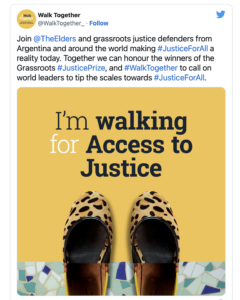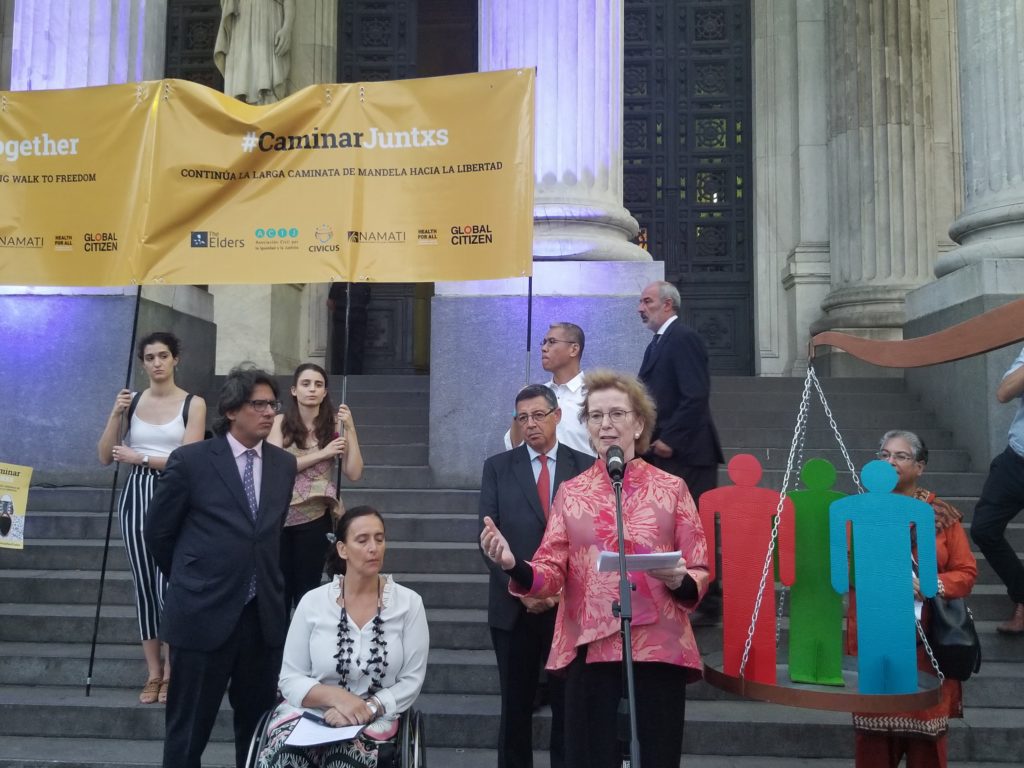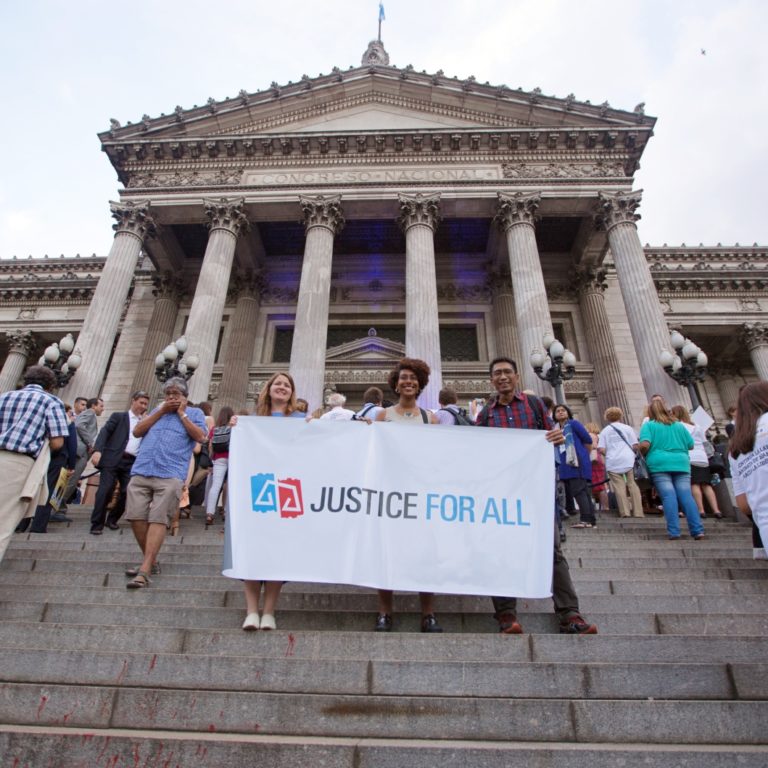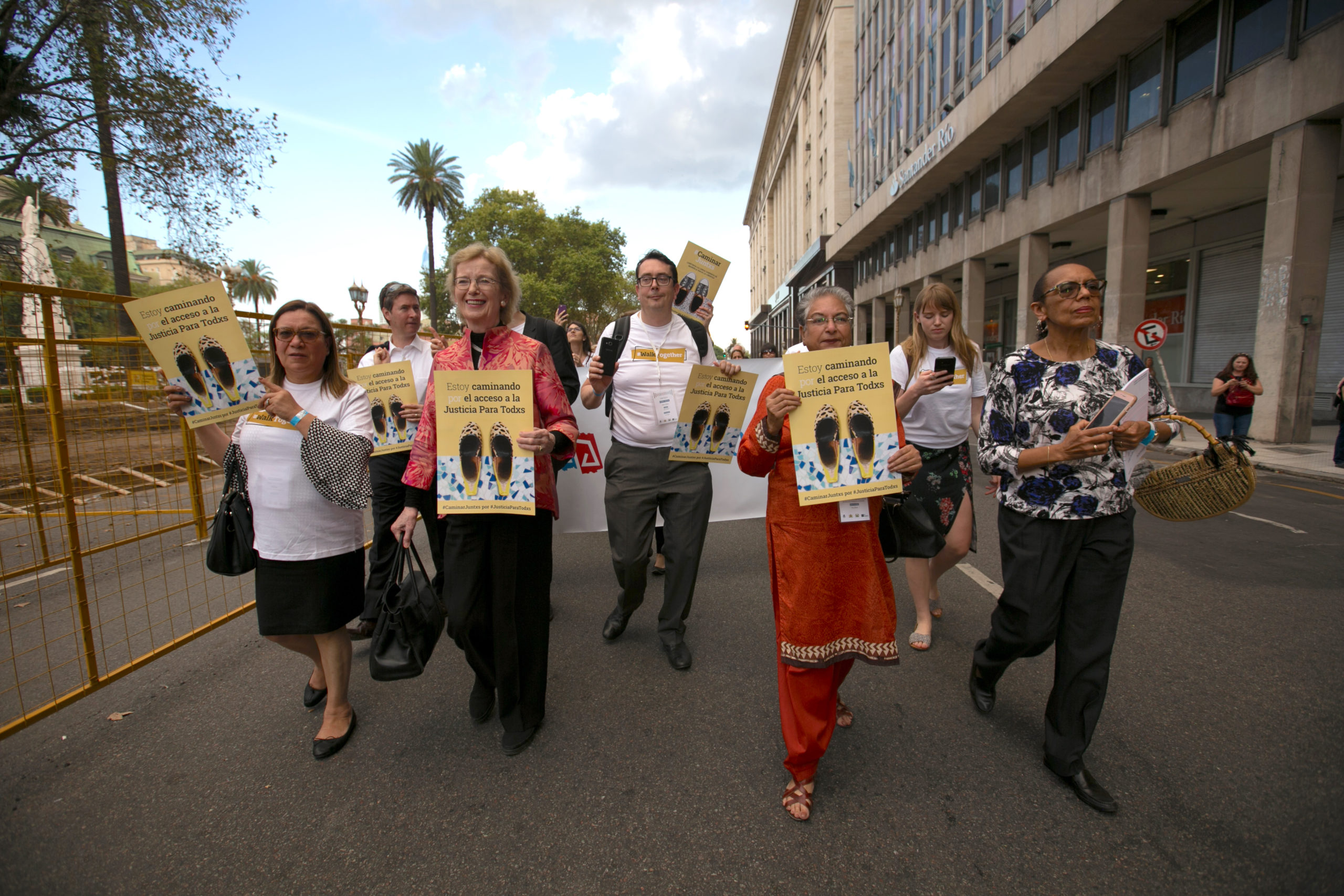The Grassroots Justice Network served as the coordination hub for the Justice For All campaign, helping to manage a coalition of actors and to design and execute advocacy products and collective actions.
Building and Managing the Coalition
 Our network directed campaign depended on partnerships to generate momentum and ensure our messaging reached our target audiences, including donors and policymakers. At the launch of the campaign, the Grassroots Justice Network was still a relatively new entity with limited recognition and voice in global dialogues, and limited resources to drive a global campaign. We knew, however, that our network had huge value to offer, and members were critical to the success of the SDGs. We recognized that we would need to partner with like-minded organizations, and find key allies who could open closed spaces.
Our network directed campaign depended on partnerships to generate momentum and ensure our messaging reached our target audiences, including donors and policymakers. At the launch of the campaign, the Grassroots Justice Network was still a relatively new entity with limited recognition and voice in global dialogues, and limited resources to drive a global campaign. We knew, however, that our network had huge value to offer, and members were critical to the success of the SDGs. We recognized that we would need to partner with like-minded organizations, and find key allies who could open closed spaces.
During the campaign design phase, we were approached by The Elders, who were in the midst of launching their own one year campaign to mark what would have been Nelson Mandela’s 100th birthday. The Walk Together campaign aimed to lift up grassroots movements and voices, with Justice being one of the critical issues The Elders championed. It was serendipitous timing, and The Elders became one of the first coalition partners who were not an existing member of the Grassroots Justice Network, offering their moral leadership to our movement. Having the Elders support the launch of Justice For All as part of their campaign allowed us to launch with huge momentum and to reach much larger and more diverse audiences. Justice organizations, including The Open Society Justice Initiative, Asociación Civil por la Igualdad y la Justicia (ACIJ), the World Justice Project, and ABA ROLI were also founding coalition members.
There was also a wider alliance around the campaign coalition. The Pathfinders for Peace, Just and Inclusive Societies was a critical partner for launch and throughout the campaign, as were a number of allies in philanthropy and government departments. These organizations and individuals could not formally join the coalition, which was exclusively for non-government actors, but were critical to the success of the Justice For All campaign and vital in forging links between grassroots justice defenders and decision makers.
Why the rule of law is essential to justice, peace, and economic and social progress.
Read Mary Robinson's op-ed from the campaign launch.


The first year of the campaign was dedicated to strengthening the campaign coalition, to bringing in new organizations, building solidarity, and harnessing our ability to advocate for change. We held multiple campaign launches to educate organizations in different regions, time zones, and language communities about the campaign and to invite partners to join.
We set up monthly coalition calls to bring together national, regional and global partners, to share updates, and to coordinate actions. We created a shared work plan to strengthen collaboration. Different groupings of coalition members planned and organized events, carried out research, and created communication products. We planned our advocacy approaches with decision makers, deciding whether the best approach was for one lead to steer the conversation, or for multiple organizations to reach out singing from the same hymn sheet.
Members helped each other outside of collective actions, providing technical support to others across regions and continents. Key allies from philanthropy and government were invited to join these calls and agreed they were a great space to connect to national organizations and learn how they could further support the movement.
Cross Movement Collaboration
The campaign team also actively engaged in other coalitions, including the TAP Network and Open Government Partnership (OGP) working groups. In Latin America, our coalition engaged with groups advocating for the ratification and implementation of the Escazu Agreement. We tried to facilitate communication between the different coalitions and networks we were a part of through our monthly coalition calls and learning webinars.
Watch the Webinar: Opening Justice – Using OGP to Advance Access to Justice Reforms

In the campaign’s final year, we became a delivery partner for Global Citizen’s Recovery Plan for the World. Our hope was to expose their global audience to grassroots justice defenders and have them put direct pressure on donors and governments to fill the COVID-19 Grassroots Justice Fund and Legal Empowerment Fund. No new donors stepped up as a part of this campaign, but existing donors were convinced to up their launch investment. Ultimately, we launched the Legal Empowerment Fund at Global Citizen Live, which was broadcast live from cities across six continents, attended by thousands in person, and watched by millions online.
Lessons Learned
- The success of this campaign is fully shared among coalition members and the alliance. Having different kinds of organizations, with different expertise and audiences, allowed us to test multiple advocacy approaches and reach target audiences we could only have imagined.
- Coalition members doubled down on their efforts to achieve justice for all outside of participating in the campaign. For example, The Elders launched a new access to justice strategy during the campaign. This strategy was heavily influenced by their experiences in meeting and working with grassroots justice defenders.
- Coalition calls were more labor intensive than we imagined. Network staff had to send multiple reminders and ask members to provide updates, and even then numbers were often low on the calls. However, an independent evaluation found that these calls fostered connections, new collaborations, and a sense of not “being alone.” Having a strong facilitator, recording calls, and sharing notes for those in different time zones was important.
- Multiple partners working on a campaign action allowed us to share the associated cost among organizations who often had limited budgets. This was not a prerequisite for participation and grassroots organizations were never asked for a financial contribution.
- Additional budget to allow for multiple language communities would have been a worthwhile investment. Incorporating non-English speakers in coalition calls was challenging, simultaneous translation was expensive, and tech platforms were not as well-prepared in 2018.
- Participating in other coalitions allowed us to remain tied to the wider SDG community and to relevant developments in global dialogues. We were able to strengthen justice perspectives in their work and learn from them, including on how to safeguard grassroots justice defenders, and where we could add value in COVID Recovery plans.

